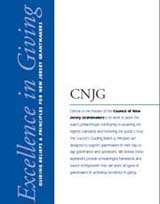Site Search
- resource provided by the Forum Network Knowledgebase.
Search Tip: Search with " " to find exact matches.
The legal staff at the Packard Foundation, Gates Foundation, Hewlett Foundation and Moore Foundation developed this free, first-of-its-kind resource, which covers the basic legal rules around what staff are allowed to fund and engage in at a private foundation.
These links and materials are presented as guides to help facilitate foundations and government agencies seeking partnerships or engagements to support mutual goals.
Council on Foundations’ Public-Philanthropic Partnership Initiative
Risks and Rewards of Partnerships an article from Let's Talk Philanthropy
The Essentials for Collaboration Between Foundations and Government from the Council on Foundations
What's the right relationship between philanthropy and government? results from a GrantCraft Study
Working with Government: Guidance for Grantmakers a guide from GrantCraft
Excellence in Giving
In 2005, CNJG adopted Guiding Beliefs & Principles to offer a thoughtful source of direction and inspiration to help guide our state’s philanthropic sector into the future. CNJG first launched its Excellence in Giving initiative in 2007 with the goal is to provide grantmakers the practical tools necessary to ensure best practice in their operations and grantmaking.
The first booklet, Guiding Beliefs & Principles for New Jersey Grantmakers includes a wealth of insights and tips related to board governance, legal compliance, grantee communications, fiscal responsibility, public disclosure, and many other key areas of foundation governance and operations. It contains wisdom provided by leaders of all types of giving organizations within the CNJG’s membership, and is intended to serve as a practical resource to assist New Jersey foundations in their grantmaking. CNJG’s board is in the process of updating these beliefs and principles in 2023/2024. For more information on the updating process, please contact Theresa Jacks.
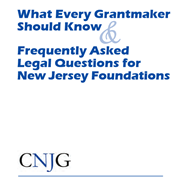 In 2010 CNJG released a second, comprehensive resource to help the state’s philanthropic community understand their ethical, legal, and fiduciary requirements and obligations - What Every Grantmaker Should Know and Frequently Asked Legal Questions. These two booklets are key publications in CNJG’s Excellence In Giving Series. While the Guiding Beliefs & Principles is available publically, members will need to log into access the legal guide for download.
In 2010 CNJG released a second, comprehensive resource to help the state’s philanthropic community understand their ethical, legal, and fiduciary requirements and obligations - What Every Grantmaker Should Know and Frequently Asked Legal Questions. These two booklets are key publications in CNJG’s Excellence In Giving Series. While the Guiding Beliefs & Principles is available publically, members will need to log into access the legal guide for download.
Members can request additional copies of the booklets mentioned on this page by contacting Theresa Jacks.
In the third session of Putting Racism on the Table (2016), Julie Nelson, Director of the Government Alliance on Race & Equity, Haas Institute for a Fair and Inclusive Society, focused on implicit bias. We encourage check out the viewing guide and discussion guide to be used with the video.
Watch the video
The Disaster Philanthropy Playbook, a comprehensive resource of best practices and innovative approaches to guide the philanthropic community in responding to future disasters, is now available for use at www.disasterphilanthropy.org/disaster-philanthropy-playbook/.
Designed as a multimedia, interactive website, the Playbook will be an “evergreen” resource designed for continued updates and knowledge-building. Community planning, civic rebuilding, legal services, housing, addressing the needs of vulnerable populations, working with local, state and federal government, mitigation and preparedness are some of the common issues faced by communities post disaster that are covered in detail in the Playbook.
The Disaster Philanthropy Playbook is a joint project of the Center for Disaster Philanthropy and Council of New Jersey Grantmakers in association with the Forum of Regional Associations of Grantmakers.
Adopted by CNJG”s Board of Trustees in October 2023, these eight Principles offer philanthropy a source of direction for their own equity journey. Each principle begins with a common understanding followed by developmental steps, and the aspiration for each principle. These principles are intended to promote continuous learning, vulnerability, and reflection for how philanthropy can evolve from its historical roots to a more trusting, accountable, and equitable model.
This tool for unstaffed foundations includes an accountability self-assessment and a legal checklist. It is divided into nine topic sections, each of which is divided into three levels, which can help foundations tailor the tool to meet their specific interests and needs. Also included are an Excel spreadsheet to help tabulate responses, an extensive accountability resource list, and a glossary of key words and concepts used in the tool.
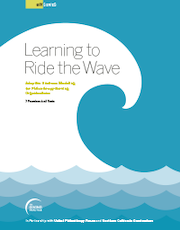
Food is essential. But how often do you consider where your food comes from?This issue of What Funders Need to Know from the Washington Regional Association of Grantmakers explores the stages of the food system, from production all the way to disposal. Why is this important to philanthropy?
Because hunger, food insecurity, nutrition-related chronic disease, the health of resource lands and waterways, wages, and equal opportunity in the food economy all converge in our regional food system.
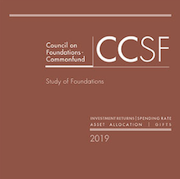
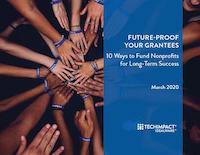
Wouldn’t it be nice if you could fund a single project that would have a positive impact throughout all of your grantees’ programs and services? There is: technology capacity building. Properly supported, the right technologies can build your grantees’ effectiveness and efficiency and multiply the impact of your other grants and programs. Many foundations are reluctant to support technology projects. As a result, many nonprofits are reluctant to directly ask for that support.
Tech Impact Idealware created this guide as a resource to bridge that gap.


